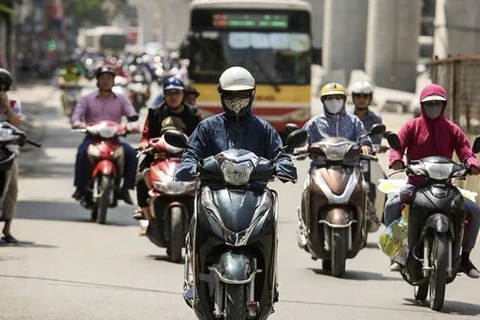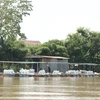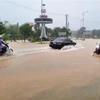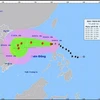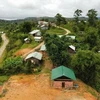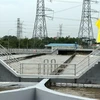 A tropical cyclone is a generic term used by meteorologists to describe a rotating, organised system of clouds and thunderstorms that originates over tropical or subtropical waters and has closed, low-level circulation. (Photo: kinhtemoitruong.vn)
A tropical cyclone is a generic term used by meteorologists to describe a rotating, organised system of clouds and thunderstorms that originates over tropical or subtropical waters and has closed, low-level circulation. (Photo: kinhtemoitruong.vn) The centre is also forecasting rainfall across the country to be 10-35 percent lower than the average despite two tropical cyclones expected to appear on the East Sea by the beginning of August.
Rainfalls, however, in the northern mountainous provinces and southeastern provinces may be up to 10-20 percent higher than average.
This year’s storm season will see 10-12 storms and tropical depressions on the East Sea. Of them, five to seven storms and a tropical depression could directly affect the country’s mainland, the centre has said.
Mai Van Khiem, Director of the National Hydrometeorological Forecast Centre, said they are prepared to deliver more frequent notices on dangerous weather and apply real-time tools to monitor storms and floods. Dangerous weather updates will be sent to every province with details of the projected impacts of natural disasters on socio-economic activities and vulnerable groups, Khiem said.
The national weather agency expects to be able to provide people with hourly updates by using real-time data collected from radars and satellites. This will also improve the quality of rain forecasts, and flood and landslide warnings.
Deputy Minister of Natural Resources and Environment Le Cong Thanh has asked agencies to actively monitor, evaluate, and deal with consequences of marine environmental incidents or oil spills if they occurred.
It’s also necessary to strengthen the monitoring of waves and sea currents by using marine radar for warning and forecasting of natural disasters, he said.
Furthermore, the operation of reservoirs must be supervised closely.
Thanh said the department is asking for applications of advanced scientific and technological research studies to improve weather forecasting, warnings and natural disaster prevention and control.
In the first half of this year, Vietnam faced two storms, and 59 light earthquakes, 137 hailstorms and thunderstorms. There were also five cold spells, 14 periods of heavy rain floods, two flash floods and 60 riverside-landslides. Natural disasters killed 25 people, injured 31 people and caused losses worth over 132 billion VND (5.75 million USD), according to the Vietnam Disaster Management Authority.
In Vietnam, the storm season usually lasts between July and December./.
VNA


